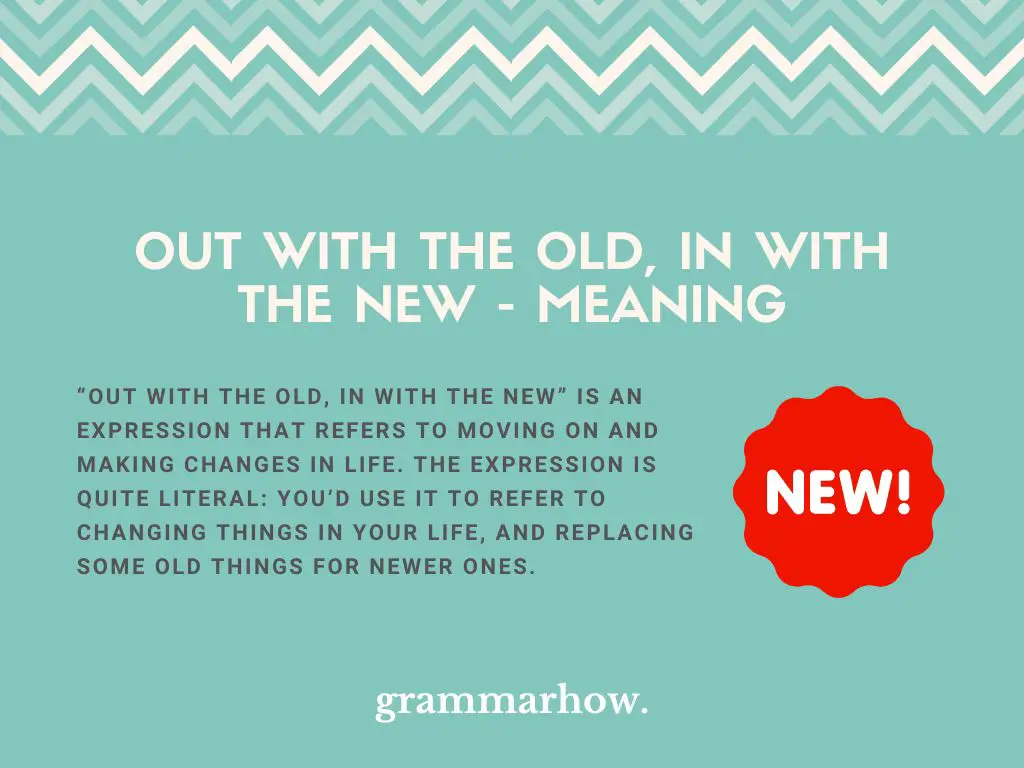“Out with the old, in with the new” is a fairly common expression, and one that you have very probably seen used before. But what does it actually mean? This article will explain its meaning so that there is no room for confusion in the way that its used.
Out With the Old, in With the New – Meaning
“Out with the old, in with the new” is an expression that refers to moving on and making changes in life. The expression is quite literal: You’d use it to refer to changing things in your life, and replacing some old things for newer ones.

Because of the ways in which we all live our lives, it’s a very applicable expression, as most people are usually in some sort of need that involves replacing the old with the new.
After all, when something becomes old, it’s fairly common for it to stop functioning quite as well, and malfunctions become quite common. “Out with the old, in with the new” tells you what to do.
How to Use “Out With the Old, in With the New” in a Sentence
“Out with the old, in with the new” is a fairly large expression, and one that is worth knowing how to properly utilize, in case you ever find yourself in a situation where it’s worth using. Here are some example sentences that will help you learn how to do that:
- You have to repaint your room a different color, out with the old, and in with the new.
- Out with the old, in with the new, so you really should save up for a better computer now.
- Out with the old, in with the new, I’m making buying a new car my priority for now.
- Out with the old and in with the new, I’m changing apartments very soon.
- She decided that she was going to follow the classic phrase: “Out with the old, in with the new”.
- “Out with the old”, she told him, “and in with the new”, as she replaced his bed covers.
- You have to replace things every once in a while, out with the old and in with the new.
Out With the Old, in With the New – Origin
We don’t know who said “out with the old, in with the new”, or where the phrase exactly comes from. All that we know is that this is a phrase that has certainly picked up a lot of steam in recent centuries, as it’s not a particularly ancient phrase.
Out With the Old, in With the New – Synonyms
The sentiment expressed by “out with the old, in with the new” is one that is very applicable to many situations in life: It evokes the age of things, and how sometimes you have to replace the old with the new. Here are some English phrases that evoke these feelings:
- You have to replace the old with the new.
- New things can serve as replacements for old things.
- When something is old and doesn’t work, you replace it with the new.
- The new is often better than the old.
- It’s valuable to replace the old with the new sometimes.
Phrases That Mean the Opposite of “Out With the Old, in With the New”
The main meaning of “out with the old, in with the new” is the idea that old things have to be replaced with new things. However, some phrases actually hold the complete opposite meaning of this phrase. Here are some of these phrases:
- The old can often be equally as good as the new.
- New things are not necessarily better than the old things.
- If the old is still working, why would you replace it with the new?
- You don’t have to replace the old with the new if the old still works.
- If something is new that doesn’t mean it has to replace the old.
Incorrect Ways to Use “Out With the Old, in With the New”
The phrase “out with the old, in with the new” necessarily implies a state in which the old and the new cannot coexist. Therefore, it’s incorrect to use this phrase when the old and the new are existing at the same time.
You have got to use this phrase only in scenarios that involve replacement, which is why the phrase uses the words “out” and “in”.
In What Situations Can You Use “Out With the Old, in With the New”?
You’d use this phrase in situations that involve change, moving forward and switching up things. So for example, if you’re selling old furniture and buying new furniture, that would be a perfect example of this phrase.
You can also use this phrase if you’re leaving an old job for a newer one, moving forward with a different direction in life, and switching your priorities up.

Martin holds a Master’s degree in Finance and International Business. He has six years of experience in professional communication with clients, executives, and colleagues. Furthermore, he has teaching experience from Aarhus University. Martin has been featured as an expert in communication and teaching on Forbes and Shopify. Read more about Martin here.
